| | Mathison Museum of Natural History |  |
|
+17Birdsage Bonnie Saarlooswolfhound widukind Joliezac spacelab Pardofelis landrover Megaptera lucky luke rogerpgvg Jill George pipsxlch Duck-Anch-Amun Kikimalou Roger 21 posters |
|
| Author | Message |
|---|
Joliezac
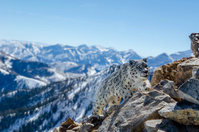
Country/State : New Jersey, USA
Age : 22
Joined : 2021-04-26
Posts : 2428
 |  Subject: Re: Mathison Museum of Natural History Subject: Re: Mathison Museum of Natural History  Wed Feb 02, 2022 9:33 pm Wed Feb 02, 2022 9:33 pm | |
| I didn’t know Colorata made a Philippine eagle! Very beautiful model!
_________________
Jolie
Animal Ark Website
Animal Figure Photography Website
|
|
  | |
Caracal
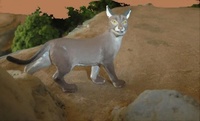
Country/State : France
Age : 65
Joined : 2018-10-24
Posts : 7252
 | |
  | |
bmathison1972
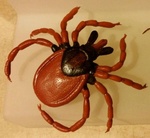
Country/State : Salt Lake City, UT
Age : 52
Joined : 2010-04-13
Posts : 6710
 |  Subject: Re: Mathison Museum of Natural History Subject: Re: Mathison Museum of Natural History  Thu Feb 03, 2022 1:56 pm Thu Feb 03, 2022 1:56 pm | |
| - Caracal wrote:
What's its prey?  Can't tell; maybe a colugo or flying squirrel. It's under the left talon. Next up: Species: Oncorhynchus rhodurus Jordan & McGregor, 1925 (Biwa trout) About the Figure: Manufacturer: Kaiyodo Series: Capsule Q Museum - Biwako Year of Production: 2014 Size/Scale: Body length 6.0 cm for a scale of 1:6.7-1:8.3 Frequency of species in toy/figure form (at time of posting): Unique Miscellaneous Notes: The figure attaches to its habitat-style base with a small clear acrylic rod, from which it is removable. About the Animal: Geographic distribution: Japan; naturally endemic to Lake Biwa, introduced to Lake Chûzenji and Lake Ashinoko Habitat: Freshwater lakes Diet: Plankton, aquatic invertebrates, smaller fish, amphibians IUCN Status (at time of posting): Not Evaluated Miscellaneous Notes: Oncorhynchus rhodurus is sometimes considered a subspecies of the masou salmon, O. masou. [You must be registered and logged in to see this image.] |
|
  | |
Caracal

Country/State : France
Age : 65
Joined : 2018-10-24
Posts : 7252
 |  Subject: Re: Mathison Museum of Natural History Subject: Re: Mathison Museum of Natural History  Thu Feb 03, 2022 2:31 pm Thu Feb 03, 2022 2:31 pm | |
| |
|
  | |
widukind
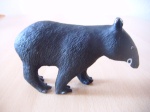
Country/State : Germany
Age : 48
Joined : 2010-12-30
Posts : 45745
 |  Subject: Re: Mathison Museum of Natural History Subject: Re: Mathison Museum of Natural History  Thu Feb 03, 2022 5:42 pm Thu Feb 03, 2022 5:42 pm | |
| |
|
  | |
bmathison1972

Country/State : Salt Lake City, UT
Age : 52
Joined : 2010-04-13
Posts : 6710
 |  Subject: Re: Mathison Museum of Natural History Subject: Re: Mathison Museum of Natural History  Fri Feb 04, 2022 12:32 pm Fri Feb 04, 2022 12:32 pm | |
| Species: Ranoidea aurea (Lesson, 1829) (green and gold bell frog) About the Figure: Manufacturer: Cadbury Series: Yowies Series 4 Year of Production: 1999 Size/Scale: Body length 3.7 cm for a scale of 1:1.5-1:3 depending on the sex Frequency of species in toy/figure form (at time of posting): Very rare Miscellaneous Notes: Being an original Australian Yowie, some assembly is required. Cadbury also released a solid-piece figure of this species in the UK Yowies series. About the Animal: Geographic distribution: Southeastern Australia; introduced to New Zealand (North Island), New Caledonia, Vanuatu Habitat: Coastal swamps, wetlands, marshes, dams, ditches, ephemeral pools, small rivers, and disturbed areas, usually water free of native fish species; typically among vegetation near the water Diet: Tadpoles eat detritus, algae, and bacteria; adults eat invertebrates and other frogs, even their own species IUCN Status (at time of posting): Vulnerable Miscellaneous Notes: Ranoidea aurea has disappeared from about 90% of its original range since the 1960s; most of that loss is interior and due to habitat destruction. Most of the populations today on mainland Australia are in the Sydney area. It also occurs on the coastal islands of Kooragang Island, Broughton Island, and Bowen Island, and has been introduced to New Zealand (North Island), New Caledonia, and Vanuatu. [You must be registered and logged in to see this image.] |
|
  | |
Caracal

Country/State : France
Age : 65
Joined : 2018-10-24
Posts : 7252
 | |
  | |
lucky luke
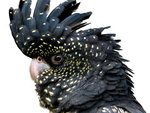
Country/State : FRANCE Saint-Louis
Age : 62
Joined : 2010-07-17
Posts : 6296
 |  Subject: Re: Mathison Museum of Natural History Subject: Re: Mathison Museum of Natural History  Fri Feb 04, 2022 4:22 pm Fri Feb 04, 2022 4:22 pm | |
| |
|
  | |
bmathison1972

Country/State : Salt Lake City, UT
Age : 52
Joined : 2010-04-13
Posts : 6710
 |  Subject: Re: Mathison Museum of Natural History Subject: Re: Mathison Museum of Natural History  Fri Feb 04, 2022 5:09 pm Fri Feb 04, 2022 5:09 pm | |
| |
|
  | |
bmathison1972

Country/State : Salt Lake City, UT
Age : 52
Joined : 2010-04-13
Posts : 6710
 |  Subject: Re: Mathison Museum of Natural History Subject: Re: Mathison Museum of Natural History  Sat Feb 05, 2022 1:41 pm Sat Feb 05, 2022 1:41 pm | |
| Species: Pipa pipa (Linnaeus, 1758) (common Surinam toad) About the Figure: Manufacturer: Agatsuma Entertainment Series: Amazing Creatures Year of Production: unknown Size/Scale: Base 8.0 cm wide. Body length 4.5 cm for a scale of 1:2.3-1:3.4 Frequency of species in toy/figure form (at time of posting): Very rare Miscellaneous Notes: The figure comes with a smooth black oval base with its Japanese name (see inset) to which it attaches with a small acrylic rod. Although not obvious in these pics, the frog is sculpted with a small fish in its mouth. The only other sculpt of this species I am familiar with is the 1996 figure by Play Visions, which was reissued by Yujin in 2002. About the Animal: Geographic distribution: Northern South America Habitat: Tropical and subtropical swamps, freshwater marshes, sluggish rivers and canals; usually habitats with muddy bottoms Diet: Aquatic invertebrates, small fish IUCN Status (at time of posting): Least Concern Miscellaneous Notes: After mating, females carry the fertile eggs around with them in pockets in the skin on the their backs. The young develop through the tadpole stage in these pockets and hatch as small toads after about 12-20 weeks. [You must be registered and logged in to see this image.] |
|
  | |
widukind

Country/State : Germany
Age : 48
Joined : 2010-12-30
Posts : 45745
 |  Subject: Re: Mathison Museum of Natural History Subject: Re: Mathison Museum of Natural History  Sat Feb 05, 2022 1:48 pm Sat Feb 05, 2022 1:48 pm | |
| |
|
  | |
Caracal

Country/State : France
Age : 65
Joined : 2018-10-24
Posts : 7252
 | |
  | |
Saarlooswolfhound
Moderator

Country/State : USA
Age : 28
Joined : 2012-06-16
Posts : 12055
 |  Subject: Re: Mathison Museum of Natural History Subject: Re: Mathison Museum of Natural History  Sat Feb 05, 2022 6:58 pm Sat Feb 05, 2022 6:58 pm | |
| My dad had a computer engineering book set with different animals on the covers. There was one with this frog and her back was hatching... I still get heebie jeebies when I come across this species. _________________ -"I loathe people who keep dogs. They are cowards who haven’t got the guts to bite people themselves."-August Strindberg (However, anyone who knows me knows I love dogs [You must be registered and logged in to see this image.] ) -“We can try to kill all that is native, string it up by its hind legs for all to see, but spirit howls and wildness endures.”-Anonymous |
|
  | |
bmathison1972

Country/State : Salt Lake City, UT
Age : 52
Joined : 2010-04-13
Posts : 6710
 |  Subject: Re: Mathison Museum of Natural History Subject: Re: Mathison Museum of Natural History  Sat Feb 05, 2022 9:50 pm Sat Feb 05, 2022 9:50 pm | |
| - Saarlooswolfhound wrote:
- My dad had a computer engineering book set with different animals on the covers. There was one with this frog and her back was hatching... I still get heebie jeebies when I come across this species.
yeah it's one of the few things is nature that creeps me out too, I won't lie... |
|
  | |
bmathison1972

Country/State : Salt Lake City, UT
Age : 52
Joined : 2010-04-13
Posts : 6710
 |  Subject: Re: Mathison Museum of Natural History Subject: Re: Mathison Museum of Natural History  Sun Feb 06, 2022 2:31 pm Sun Feb 06, 2022 2:31 pm | |
| Species: Physalia physalis (Linnaeus, 1758) (Portuguese man o' war) About the Figure: Manufacturer: Takara Tomy A.R.T.S. Series: Encyclopedia of Dangerous Organisms Year of Production: 2020 Size/Scale: Figure height 5.5 cm. Pneumatophore 4.0 cm long for a scale of 1:2.25-1:7.5 Frequency of species in toy/figure form (at time of posting): Very rare Miscellaneous Notes: Minimal assembly required. The dactylozooids are splayed at the bottom, not entirely realistic but it allows the figure to stand on its own. About the Animal: Geographic distribution: Worldwide in tropical and subtropical oceans Habitat: Pelagic; neuston Diet: Fish, marine invertebrates, plankton IUCN Status (at time of posting): Not Evaluated Miscellaneous Notes: Physalia physalis is not a single animal, but rather a colony of animals living together and functioning as a single entity. The large structure visible above water is a pneumatophore, which is used for buoyancy and acts as a sail for passive movement. Hanging from the pneumatophore are individual animals called zooids; different zooids have different names based on their primary function. The long tentacle-like zooids used for hunting and feeding are called dactylozooids. After prey is captured by the dactylozooids, it is digested by the gastrozooids. The zooids used for reproduction are gonophores, which are located on branching structures called gonodendra. The gonodendra have additional accessory zooids, including palpons (accessory digestive structures), nectophores (allow detached gonodendra to swim), and nectophores (also possibly involved in locomotion). [You must be registered and logged in to see this image.] |
|
  | |
Caracal

Country/State : France
Age : 65
Joined : 2018-10-24
Posts : 7252
 | |
  | |
bmathison1972

Country/State : Salt Lake City, UT
Age : 52
Joined : 2010-04-13
Posts : 6710
 |  Subject: Re: Mathison Museum of Natural History Subject: Re: Mathison Museum of Natural History  Mon Feb 07, 2022 1:14 pm Mon Feb 07, 2022 1:14 pm | |
| Species: Mephitis mephitis (Schreber, 1776) (striped skunk) About the Figure: Manufacturer: Schleich Series: Wild Life America Year of Production: 2012 Size/Scale: Figure length 6.0 cm. Total body length including tail about 8.0 cm for a scale of 1:6.25-1:10 (see below) Frequency of species in toy/figure form (at time of posting): Uncommon Miscellaneous Notes: Such a familiar animal, Mephitis mephitis surprisingly has not produced in toy form very often over the years. I initially had the 2010 CollectA model, but the paint had been applied horribly and the more I studied it, the more I felt it was sculpted and painted after a juvenile. To me, the two best are today's and another by Schleich, which was released as part of a box set in 2017. Many M. mephitis figures aren't painted very accurately for the head, body, and tail together. The scale above is based on a total body length range of 50-80 cm; no two references seemed to have the exact same data but generally fell within this range. About the Animal: Geographic distribution: North America Habitat: Forests, mixed woodlands, wooded ravines, grassy plains, parks, urban and suburban neighborhoods Diet: Primarily insects; also other invertebrates, small mammals, eggs, reptiles, amphibians, fish, carrion, fruit IUCN Status (at time of posting): Least Concern Miscellaneous Notes: Mephitis mephitis is well known for its chemical defensive behavior. The skunk possesses two highly-developed scent glands on either side of the anus that contain about 15 mL of musk, each. The musk is a mixture of thiols, including (E)-2-butene-1-thiol, 3-methyl-1-butanethiol, S-(E)-2-butenyl thioacetate, S-3-methylbutanyl thioacetate, 2-methylquinoline, 2-quinolinemethanethiol, and S-2-quinolinemethyl thioacetate. The skunk can discharge its musk to a distance of about 6 meters. Contact of the musk with eyes and mucus membranes can result in nausea, intense pain, and temporary blindness. [You must be registered and logged in to see this image.] |
|
  | |
Caracal

Country/State : France
Age : 65
Joined : 2018-10-24
Posts : 7252
 |  Subject: Re: Mathison Museum of Natural History Subject: Re: Mathison Museum of Natural History  Mon Feb 07, 2022 1:52 pm Mon Feb 07, 2022 1:52 pm | |
| 5 or 6 m?!.. what a shoot!  |
|
  | |
widukind

Country/State : Germany
Age : 48
Joined : 2010-12-30
Posts : 45745
 |  Subject: Re: Mathison Museum of Natural History Subject: Re: Mathison Museum of Natural History  Mon Feb 07, 2022 3:57 pm Mon Feb 07, 2022 3:57 pm | |
| |
|
  | |
bmathison1972

Country/State : Salt Lake City, UT
Age : 52
Joined : 2010-04-13
Posts : 6710
 |  Subject: Re: Mathison Museum of Natural History Subject: Re: Mathison Museum of Natural History  Tue Feb 08, 2022 12:53 pm Tue Feb 08, 2022 12:53 pm | |
| Species: Hippocampus reidi Ginsburg, 1933 (slender seahorse; longsnout seahorse) About the Figure: Manufacturer: Schleich Series: Wild Life Ocean Year of Production: 2013 Size/Scale: Figure 6.0 cm tall. Body length 9.5 cm for a scale of 1:1.8 Frequency of species in toy/figure form (at time of posting): Unique Miscellaneous Notes: I am not sure if Schleich marketed this figure as this species, or if this is a community-based identification, but it is a sound ID either way. The base around the tail is rather sloppily painted, at least on my figure. About the Animal: Geographic distribution: West Atlantic, from Southeastern USA to Brazil Habitat: Coral reefs, seagrass beds, mangroves; to depth of 55 meters Diet: Microcrustaceans IUCN Status (at time of posting): Near Threatened Miscellaneous Notes: Hippocampus reidi mates for life and paired couples have complicated courtship and bonding rituals. Like many other seahorses, males of H. reidi carry the embryos to term in their brood pouches. [You must be registered and logged in to see this image.] |
|
  | |
widukind

Country/State : Germany
Age : 48
Joined : 2010-12-30
Posts : 45745
 |  Subject: Re: Mathison Museum of Natural History Subject: Re: Mathison Museum of Natural History  Tue Feb 08, 2022 12:53 pm Tue Feb 08, 2022 12:53 pm | |
| |
|
  | |
Caracal

Country/State : France
Age : 65
Joined : 2018-10-24
Posts : 7252
 | |
  | |
bmathison1972

Country/State : Salt Lake City, UT
Age : 52
Joined : 2010-04-13
Posts : 6710
 |  Subject: Re: Mathison Museum of Natural History Subject: Re: Mathison Museum of Natural History  Wed Feb 09, 2022 12:30 pm Wed Feb 09, 2022 12:30 pm | |
| Species: Rhina ancylostoma Bloch & Schneider, 1801 (bowmouth guitarfish; shark ray) About the Figure: Manufacturers: Safari Ltd.; CollectA Series: Wild Safari Sealife (Safari Ltd.); Sealife (CollectA) Years of Production: 2007 (Safari Ltd.); 2017 (CollectA) Size/Scale: Body length of CollectA adult 15.5 cm for a scale of 1:10-1:17. Body length of Safari juvenile 13.0 cm, presumably within scale of the CollectA adult (see below). Frequency of species in toy/figure form (at time of posting): Uncommon to rare Miscellaneous Notes: I had originally bought the Safari figure, but later bought the CollectA figure to replace it since the latter represents an adult. However, I could not bring myself to part with the Safari figure, and so I kept them both. One of the few instances where the 'synoptic non-arthropod' part of my collection isn't so synoptic; the same phenomenon occurred with the zebra shark! I was debating on whether I should review these two separately or together, but since it's unlikely I'll buy another bowmouth guitarfish figure, I decided to do them together. I had trouble researching the size of juvenile R. ancylostoma that bear the color pattern of the Safari figure, but it probably scales OK with the CollectA adult. Schleich also produced a nice adult and Colorata a nice juvenile, which may scale better with 'standard-sized' adults. About the Animal: Geographic distribution: Indo-West Pacific Habitat: Benthic, demersal; usually in areas with sandy or muddy bottoms, also coral reefs, usually at depths of 3-90 meters Diet: Fish, marine invertebrates IUCN Status (at time of posting): Critically Endangered Miscellaneous Notes: Rhina ancylostoma is ovoviviparous, with developing embryos sustained on a yolk within the uterus. Litter sizes vary from 2-11, and newborn rays are on average 45-50 cm in length. [You must be registered and logged in to see this image.] |
|
  | |
Caracal

Country/State : France
Age : 65
Joined : 2018-10-24
Posts : 7252
 | |
  | |
Roger
Admin
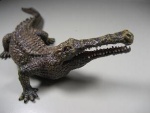
Country/State : Portugal
Age : 50
Joined : 2010-08-20
Posts : 35835
 |  Subject: Re: Mathison Museum of Natural History Subject: Re: Mathison Museum of Natural History  Wed Feb 09, 2022 1:58 pm Wed Feb 09, 2022 1:58 pm | |
| I don't have this species in my collection but I find it interesting when figures representing two different stages match so nicely. There's a similar story with the Safari and CollectA zebra sharks. |
|
  | |
Sponsored content
 |  Subject: Re: Mathison Museum of Natural History Subject: Re: Mathison Museum of Natural History  | |
| |
|
  | |
| | Mathison Museum of Natural History |  |
|
